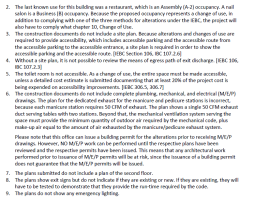Plan review is a critical step in ensuring that building projects comply with code requirements. However, the question often arises: To what extent should plan reviewers delve into the various disciplines involved in a project? Should they defer to the expertise of licensed professionals, or should they critically examine each aspect of the design?
However, it is not only acceptable but also necessary for reviewers to question the work of design professionals when warranted. The role of the reviewer is to ensure that the project meets the minimum code requirements, and this responsibility should not be overshadowed by the credentials of the designer. If there is a concern that something may not comply with the code, the reviewer should feel empowered to raise that question and request clarification or evidence of compliance.
For example, when reviewing the mechanical portion of a project, a reviewer might encounter areas where information is not clearly presented in the construction plans but is instead detailed in the project specifications. In such cases, the reviewer should phrase comments in a way that invites clarification, such as “Please verify,” “Please confirm,” or “It appears that...”. This approach opens the door for the design professional to provide the necessary details without feeling accused of making an error.
When conducting a review, it’s important to focus on key principles:
The Role of the Plan Reviewer
A common misconception among plan reviewers is that they must be experts in every discipline they review. This belief is often reinforced by interactions with design professionals who may challenge the reviewer’s authority. Statements like “Who are you to question me?” can lead reviewers to doubt their own ability to comment on specific designs, especially when they lack equivalent training and experience.However, it is not only acceptable but also necessary for reviewers to question the work of design professionals when warranted. The role of the reviewer is to ensure that the project meets the minimum code requirements, and this responsibility should not be overshadowed by the credentials of the designer. If there is a concern that something may not comply with the code, the reviewer should feel empowered to raise that question and request clarification or evidence of compliance.
Communication: The Key to Collaboration
Effective communication is essential in the review process. By asking questions in a respectful and professional manner, reviewers can foster a collaborative environment where both parties work together to ensure the project’s success. The goal is not to undermine the design professional but to ensure that all code requirements are met, creating a safer and more compliant building.For example, when reviewing the mechanical portion of a project, a reviewer might encounter areas where information is not clearly presented in the construction plans but is instead detailed in the project specifications. In such cases, the reviewer should phrase comments in a way that invites clarification, such as “Please verify,” “Please confirm,” or “It appears that...”. This approach opens the door for the design professional to provide the necessary details without feeling accused of making an error.
Striking the Right Balance in Plan Review
Given the wide range of disciplines involved in construction, it is unrealistic to expect any single reviewer to be an expert in all areas. Nevertheless, reviewers should strive to familiarize themselves with all aspects of the code and approach each review as an opportunity for professional growth.When conducting a review, it’s important to focus on key principles:
- Prioritize Life Safety: The primary responsibility of the reviewer is to ensure that life safety elements are adequately addressed in the design. This should be a focal point of every review.
- Cite the Code, Don’t Rewrite It: Comments should be concise and directly linked to specific code sections. There is no need to rewrite the text of the code—simply citing the relevant section is sufficient.
- Avoid Commenting on Means and Methods: The plan review should focus strictly on code compliance, not on the means and methods of construction. These are the responsibility of the contractor and design team.
- Use Preliminary Comments Wisely: If a project has numerous issues, consider issuing preliminary comments to guide the design team in resolving major concerns. However, make it clear that these are not comprehensive and that a full review will follow.


